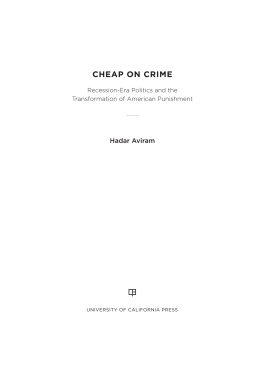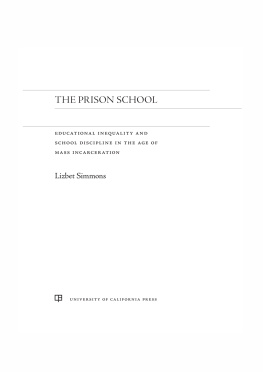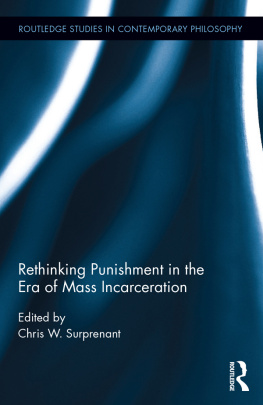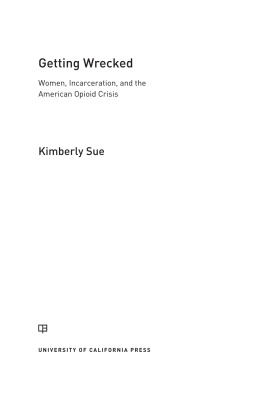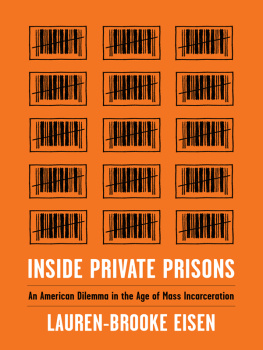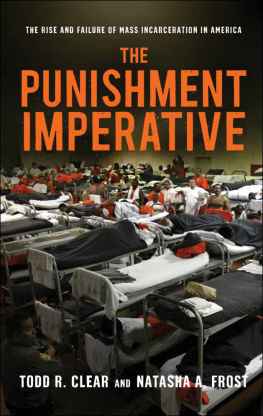ACKNOWLEDGMENTS
The seed for this book was planted in 2008, when several of my colleagues at UC Hastings College of the Law met to discuss the possibility of organizing a conference on the California correctional crisis. We were expecting a decision in Plata v. Schwarzenegger to be delivered later in the year, and as a newcomer to the American correctional scene, I decided to start a blog about corrections in California as a way to promote the conference, as well as a vehicle to learn and educate.
A few months after the blog came to life I started noticing cracks in the punitive facade of American punishment and identifying nonpunitive trends justified by cost arguments. I started collecting examples of these trends on the blog and thinking about them more deeply. The California Correctional Crisis conference of 2009 was an opportunity to start pondering the future of the criminal justice system, and it yielded my first publication on recession-era criminal justice policy. This book was already well under way when we held a sequel conference in 2013, California Correctional Crisis: Realignment and Reform. My work on the blog and the conferences, and my involvement in advocacy and education in California, allowed me to engage with lawmakers, advocates, activists, families of victims and offenders, and formerly incarcerated people and discuss the main themes of this book.
During the course of the project, I received wonderful feedback and advice from many scholars and activists working on criminal justice and corrections. My mentor and friend, Malcolm Feeley, offered advice and asked excellent questions about privatization. Margo Schlanger and Sharon Dolovich organized an informative prison research workshop, during which I had an opportunity to think about the broad themes of the book. David Ball offered a money-savvy, pragmatic perspective on local government. Mona Lynch and Jonathan Simon sat with me for dinner in Ann Arbor, heard the first version of the thesis, and provided support and constructive feedback. David Greenberg sent numerous useful newspaper clippings. Selena Teji exchanged ideas and thoughts about the California Criminal Justice Realignment. Jeanne Woodford and Ana Zamora offered thoughts about the death penalty abolition campaign. Alessandro De Giorgi, Ben Fleury-Steiner, Paul Kaplan, Edi Kinney, Josh Page, Michelle Phelps, Keramet Reiter, Kimberly Richman, Ashley Rubin, and other members of the Punishment and Social Control collaborative research network met with me at conferences and enriched the creative process with their thoughts and perspectives. The good people at KALW, the Daily Journal, CBS-5, KTVU, the San Francisco Bay Guardian, and the Recorder gave me opportunities to speak with, and hear from, the public on current events. The excellent and dedicated lawyers at the Prison Law Office and at Rosen, Bien, Galvan and Grundfeld offered food for thought at every encounter. The Crime Group at Hebrew University, the Law and Society Forum at Haifa University, the law school at the University of Hong Kong, and the Law and Society research group at the University of Hawaii at Mnoa graciously invited me for workshops and offered feedback that transcended the national context. Michael Munger, Barry Winegast, and Todd Zywicki taught me public choice economics and furnished me with enriching tools and vocabulary that came just at the right moment.
My colleagues at Hastings were invaluable in shaping my ideas and offered advice and resources. Special thanks go to Kate Bloch, George Bisharat, John Crawford, Heather Field, Caitlin Henry, Eumi Lee, Evan Lee, Rory Little, Aaron Rappaport, Dorit Reiss, Reuel Schiller, Darien Shanske, and David Takacs. Dean Frank Wu and Academic Deans Shauna Marshall and Beth Hillman provided me with institutional encouragement and support, as well as with the necessary resources, in the form of the Harry and Lillian Hastings Research Chair. All my students, and especially the members of the Criminal Law Society and the editorial board of the Hastings Race and Poverty Law Journal, inspired me to think more deeply and write better.
The book would never have come to life without the intelligent and thorough work of my phenomenal team of fact checkers and research assistants: Deanna Dyer, Alexandra Jacobs, Amanda Leaf, Ryan Newby, Lizabeth Pollack, Darah Protas, Rosie Reith, and S. C. Thomas. Chuck Marcus provided outstanding and knowledgeable library assistance.
The process of working on the book was pleasant, collaborative, and enriching thanks to everyone at the University of California Press, particularly Maura Roessner and Jack Young.
Any mistakes, omissions, and inaccuracies are, of course, my own.
Life, John Lennon said, is what happens to you while youre busy making other plans, and in the process of working on this book I suffered several medical and personal setbacks that made my work very difficult, including the prolonged illness and subsequent loss of my beloved grandfather Shmuel Katvan. Grandpa and I spoke on the phone every day during his long illness, and he frequently expressed interest in the project and asked great questions. My parents, Yael and Haim Aviram, offered immense love. Also in my circle of support were Dr. Xiao-Ping Cheng, Dr. Keely Kolmes, Karsten Gryziec, Brian Soo, the swimming community at the Sports Club L.A. and at USF Masters, the South End Rowing Club and the Marathon Swimmers Federation, Raeeka Shehabi-Yaghmai and all the singers at Taneen Voice Studio, and my cadre of brilliant and loving friends: Suzanne Atkinson, Eric Chase, Sharon Cowan, Heather Eloph, Inbal Etgar, Rosie Etis, Yael Finberg-Liebi, Shachar Fuman, Francisco Hulse, Cynthia Gmez, Amit Landau, Schachar Levin, Katie Morrison, Tal Niv, Jacqueline Omotalade, Annick Persinger, Yvonne Rathbone, and Robert Rubin.

